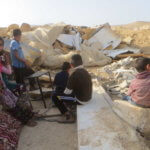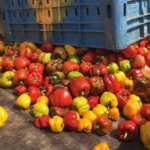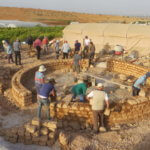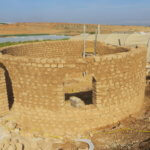Resisting Ethnic Cleansing in Fasayil
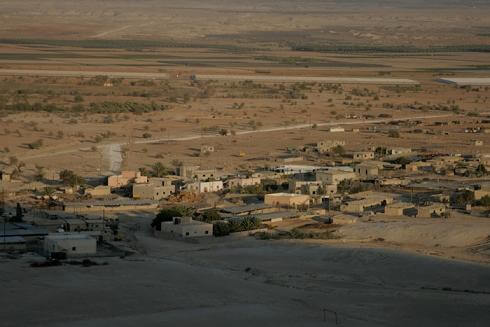 Fasayil is a Palestinian village sandwiched between two Israeli settlements, Tomer and El’Fasail, and settlement agricultural land stolen after 1967.
Fasayil is a Palestinian village sandwiched between two Israeli settlements, Tomer and El’Fasail, and settlement agricultural land stolen after 1967.
The village was divided into Area B and Area C under the misleading ‘Oslo Peace Accords’. Fasayil lies in Area B while Fasayil al-Wusta and Fasayil al-Fauqa were designated Area C. Palestinians living in Area B are allowed to build houses and schools, in addition to running water and electricity to their homes. Although deeply affected by the occupation, limited access to health and education helps living conditions.
Palestinians in Area C (95% of Jordan Valley) are denied these basic rights because they live under full Israeli civil and military control. Some of the punitive measures against the civilian population include; discriminatory planning laws which make construction nearly impossible, no provision for running water or electricity, checkpoints which restrict movement and violent military harassment including the constant threat of home demolition. Laws here are racist because their primary objective is to create a ‘democracy’ for Jews only in an area where the majority of people are Palestinian. Israeli policy is clearly designed to create the conditions where Palestinians are forced to leave their land.
Sharp inequalities are visible inside the village. Because access to running water is prohibited in Area C, trees and plants become sparse and as a result of planning laws, the tarmac road suddenly turns into rubble. Despite conditions described, a community of around 600 people living Fasayil al-Fauqa, refuse to leave their land. This struggle to exist is literally invisible to the many private coaches full of tourists shuttled past daily.
Large areas of lush green from intensive settlement agriculture give the illusion of an oasis against the background of the dry Jordan Valley landscape. In reality, this is the ugly face of apartheid. The theft of water by the Israeli state to cultivate stolen land provides a large economic incentive for continuing the illegal occupation. Israeli agricultural exports from the Jordan Valley worked out at around £86 million in 2010. Most of the Israeli produce on your supermarket shelves comes from here. Palestinians living in Fasayil have little choice but to work on the settlements surrounding their village for ILS50 (£8-12) per day (Israeli minimum wage is ILS25 per hour). Electricity is also heavily subsidized for settlers. The result is a complex inter-dependent relationship between the Israeli government (including their army), Jewish settlers involved in large scale agriculture and oppressed Palestinians working for a fraction of the minimum wage.
After many meetings and discussions between residents in Fasayil al-Fauqa and Jordan Valley Solidarity (JVS), it was decided that construction would start on a community centre made from mud bricks. On August 6 2011, around 20 volunteers from the village, supported by Palestinian and international volunteers from JVS began making mud bricks. The process is simple; dig a trench in the soil, position the portable water tanker above the trench and mix the soil with water to make mud – or ‘tina’ in Arabic. Waste straw which can no longer be used for livestock is added to the mix before buckets are carried to a designated area near the trench. Here, wooden block moulds are filled with tina to produce bricks. People work in the evening and night because of the heat. After approximately 24hrs or before we start the next night, the semi dried bricks are turned upright to complete the process. Literally thousands of mud bricks were produced this way over a 4 week period.
During the course of these 4 weeks, Palestinian and international volunteers were regularly harassed by the Israeli military. They appeared regularly at night, demanding ID from everyone and questioning what we were doing. On some of the earlier encounters, they would take the internationals to one side and warn us with concern that ‘we were in a danger’. Aware of our privilege as western passport holders, we knew to keep quiet as any provocation could potentially have more serious consequences for our Palestinian friends.
Living in Fasayil allowed us to briefly experience the harsh conditions created by the occupation. After spending time there, it would be hard for anyone not to respect how, under the circumstances, people live with a strong sense of dignity. And regardless of obvious cultural differences, display unconditional kindness to strangers.
It was crazy to hear one commander of a unit, who arrived with 8 heavily armed soldiers in two military jeeps, proclaim that we were in a dangerous area. The scariest thing was he actually believed what he was saying – Arabs were dangerous, period. Completely oblivious to the fact that we were making mud bricks in the moonlight and the only danger in this situation was soldiers whose mission was to occupy a civilian population on foreign land. This level of indoctrination is at the heart of Zionist or Israeli State policy.
For volunteers, it was clear, we were here using our time and energy, to support an oppressed Palestinian community in their struggle to remain on their land.
The soldiers, who really seemed brainwashed, were not providing ‘security’ or ‘order’, but enforcing a system of apartheid where the wholesale theft and exploitation of; land, resources and labour has been normalized.
An act of aggression by the soldiers prompted us to finish this phase of our campaign. They came during the night when nobody was around and stole our 4 tools we used to make tina bricks. They smashed the wooden moulds and destroyed a few bricks leaving a clear footprint in one. After discovering the damage, a wave of anger motivated all hands available to stockpile all of the bricks closer to the village and dig the foundations for the house.
We can only speculate why the soldier was motivated to leave his boot print in our mud brick. One thing is clear, this kind of behavior is expected – he or she didn’t need orders.
On March 10 1948, orders were dispatched from Tel Aviv to military units on the ground. Plan D (Dalet in Hebrew) detailed methods on how to cause mass terror in order to expel Palestinians from vast areas of their country. The mission took six months to complete. When it was over, more than half of Palestine’s population, 800,000 people had been expelled from their homes. 531 villages and 11 urban areas were emptied of their inhabitants. This is a clear cut example of Ethnic Cleansing,a crime against humanity.
Ethnic Cleansing always was and still is central to Israeli policy [see quotes below]. Many leaders have come and gone since celebrated Zionist and undisputable war criminal, Ben Gurion, ordered Plan D into action in 1948. Systematic expulsion of Palestinians from their land, destroying livelihoods, identity and culture in the process, remains acceptable and even perceived as a necessity by the vast majority of Israeli society. Israeli soldiers (made up of society under mandatory service), are fed a strict diet of propaganda and lies from their first day of school. Manipulating minds to the point where overwhelming force against a civilian population seems legitimate. Physical and psychological walls enforce apartheid here.
Palestinian determination to remain on their land in Fasayil is incredible. Building houses out of mud bricks can seem futile when the military continue to demolish homes in the Jordan Valley. It takes a lot of time and energy compared to more conventional methods but comes (at a very low cost) directly from the surrounding environment. Not recognizing racist planning laws feels good and is inspiring to others. Our action sends a message to racist politicians in Tel Aviv, who are using violence to create a land only for Jewish people where there is an Arab majority. Our action also sends a message to their foot soldiers on the ground and most importantly, to people standing in solidarity here and around the world, we will not lie down. Strong communities refusing to accept oppression is a critical part of resisting occupation. Together we can challenge these so called ‘accepted norms’. Not everyone has time to make mud bricks in Fasayil but people should do what they can to support this struggle. Many of us in the West can boycott Israeli produce – most of which comes from occupied Palestine and directly funds apartheid. We can take time to read behind the headlines and talk to our friends about why it’s important to know where the food on your plate comes from. History tells us that this level of oppression is unsustainable.
Fathy Khuduri, main co-coordinator of JVS campaign said, “We are supporting them to remain on their land. We are not supporting the people of Fasayil because they are poor. We are working with the people because we are trying to mobilise a civil resistance movement against the occupation, and against the Israeli ethnic cleansing project in the Jordan Valley.”
Key Facts
It is worth noting that before the land was occupied in 1967, the Palestinian population of the Jordan Valley was estimated between 300,000 and 320,000 but now is estimated at around 58,000. Currently there are around 9500 Jews living in 30 officially populated settlements. Every Jewish settler family in the Jordan Valley is given a free house, US$20,000, 70 dunnams (km2), free healthcare, a 75% discount on electricity, utilities and transportation, and an unlimited water supply. Jews from anywhere in the world are welcome to come and start a new life here while none of Palestinians forced to leave their land, or their children who were born refugees, are allowed to return.
Israeli Prime Minister Quotes
“The story of settlement in the Jordan Valley is the story of pioneering Zionism, of challenges and exceptional people, believers who bound their lives to this magnificent enterprise with few examples like it in our history. It is an example of the power of stubbornness and persistence in facing the difficulties of climate, environment, security, of firm hold in in the harsh land of the Jordan Valley until reaching results.”
Ehud Barak, Prime Minister 1999-2001
”Isreal must have secure and defensible borders to ensure its future. The Jordan Valley communities are an essential element in determining the eastern border of the state. We can maintain these communities only if the residents there are encouraged and helped”
Binyamin Netanyahu, Prime Minister 1996-1999 and 2009-present
“You don’t simply bundle people onto trucks and drive them away… I prefer to advocate that in a positive way will induce people to leave”
Ariel Sharon, Prime Minister 2001-2006


